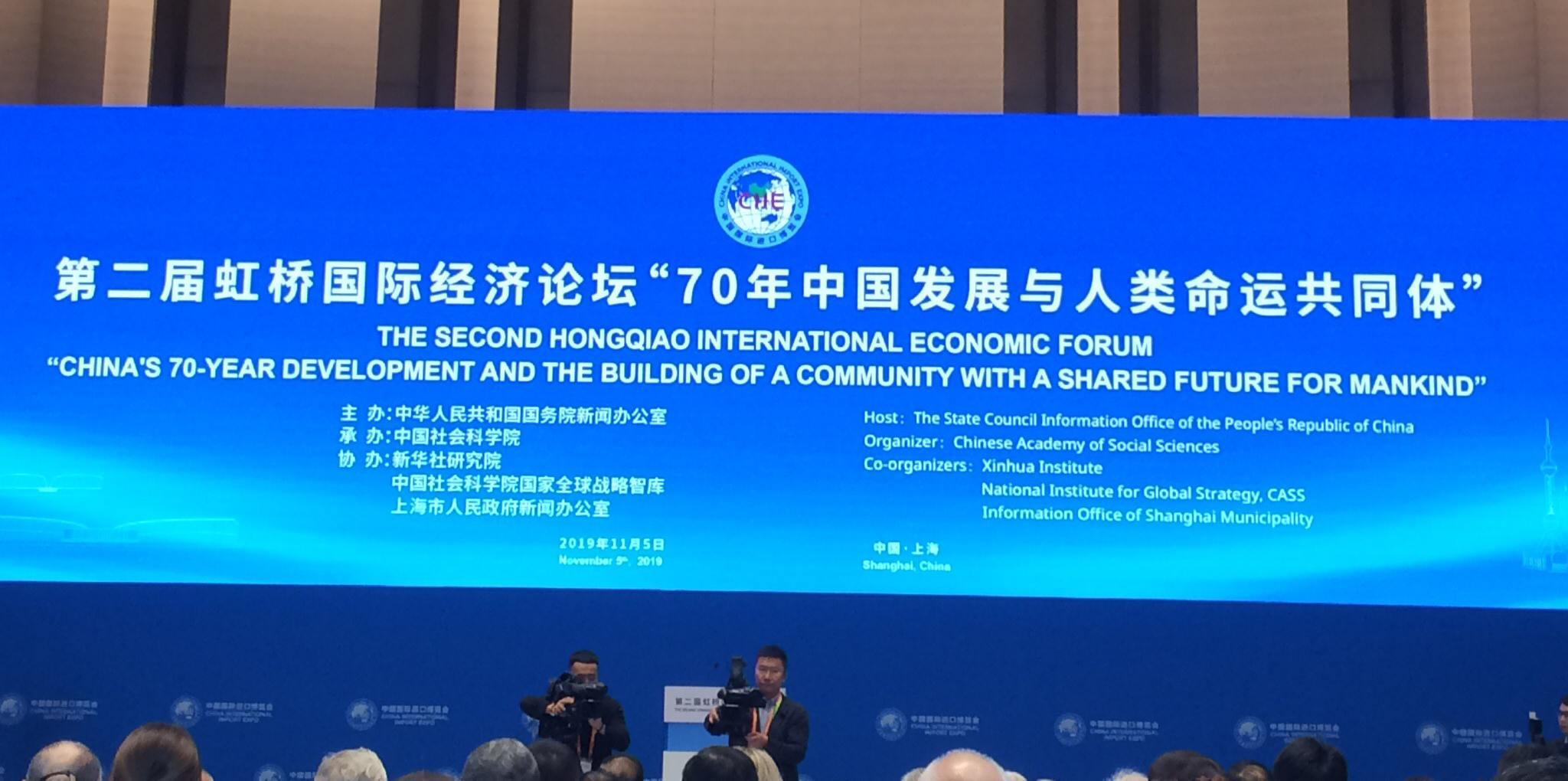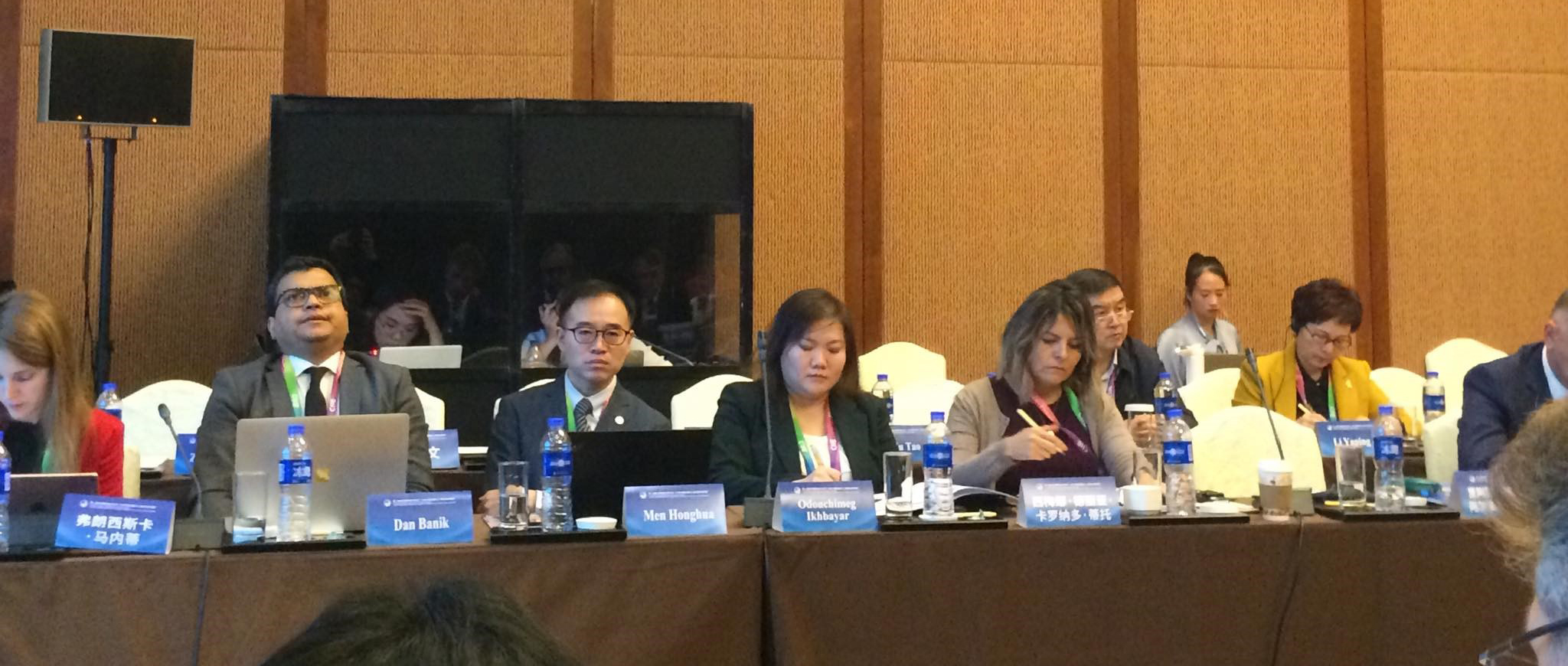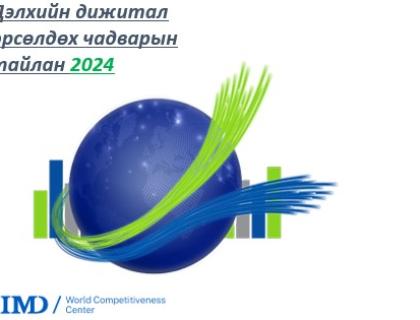2019 оны 11-р сарын 5-7 ны өдрүүдэд БНХАУ-ын Шанхай хотноо олон улсын эдийн засгийн хоёрдугаар чуулган "Хятадын 70 жилийн хөгжил ба хүн төрөлхтний хамтын ирээдүйг цогцлоох нь" сэдвийн хүрээнд болж өндөрлөлөө. Хятад улсын хөгжлийн 70 жилийн туршлага, тус улсын хөгжлийн дэлхий дахинд үзүүлэх ач холбогдлын талаар Шанхайн чуулганы туршид олон улсын судлаачдын дунд яригдаж цаашлаад хүн төрөлхтний хамтын ирээдүйтэй нийгэмлэгийг байгуулах арга зам, боломжийн талаар санал бодлоо солилцов.
Чуулганы үеэр БНХАУ нь сүүлийн 70 жилийн хугацаанд маш хурдацтай хөгжиж дэлхийн хоёр дахь том эдийн засаг болсны дээр эдийн засгийн тогтвортой, хурдацтай өсөлтийг ханган, үйлдвэржилт, хотжилт хурдацтай явагдах, шинжлэх ухаан, технологийн шинэчлэлийг дэмжих, ядуурлыг их хэмжээгээр бууруулах, ард түмний амьжиргааны түвшинг дээшлүүлэх чиглэлээр хөгжлийн баялаг туршлага хуримтлуулж, үүнийг дэлхий дахинд сурталчлан, хуваалцахыг хүсч байгаагаа илэрхийлж байв.

Дэлхийн 100 гаруй орны 270 орчим Think Thank буюу судалгаа, шинжилгээний хүрээлэнгүүдийн удирдлага, төлөөллүүд болон хэвлэл мэдээллийн төлөөлөгчид оролцсон тус чуулганд БНХАУ-ын Нийгмийн шинжлэх ухааны академи, БНХАУ-ын Олон улсын стратегийн үндэсний институтийн урилгаар Эдийн засгийн бодлого, өрсөлдөх чадварын судалгааны төвийн Дэд захирал И.Одончимэг, судлаач Н.Ган-Эрдэнэ нар оролцож олон орны судалгааны хүрээлэн, судлаачидтай санал бодлоо солилцон туршлага хуримтлуулав. “Экологийн иргэншил ба тогтвортой хөгжил” салбар хуралдааны үеэр Дэд захирал И.Одончимэг үг хэлж, Монгол Улсад ногоон эдийн засаг, тогтвортой хөгжлийн талаарх хэрэгжүүлж буй бодлого, хөтөлбөр болон болон ЭЗБӨЧСТ-ийн зүгээс хийсэн ажлууд, оролцоо мөн экологийн иргэншил, ногоон эдийн засгийн хөгжлийн талаар байр сууриа илэрхийлэв.

"Хятадын 70 жилийн хөгжил ба хүн төрөлхтний хамтын ирээдүйтэй нийгэмлэгийг байгуулах нь" сэдэвт чуулганы үеэр нэгдсэн хуралдаануудын зэрэгцээ “Орчин үеийн олон талт хайгуул судалгаа”, “Экологийн иргэншил ба тогтвортой хөгжил”, “Хятад улс ба эдийн засгийн даяаршлын түүхэн үйл явц”, “Эдийн засгийн өсөлт ба хүртээмжтэй хөгжил”, “Нээлттэй байдал, хамтын ажиллагаа, соёл иргэншлийн хэлэлцээ”, “Зөвлөгөө өгөх, Хувь нэмрээ оруулах, Хуваалцсан ашиг тус ба дэлхийн засаглал”, “БНХАУ болон бусад улс орнуудын хоорондох ядуурлыг бууруулах ажлын харьцуулалт” гэсэн салбар хуралдаанууд зэрэг үргэлжилсэн.

Хятадын засгийн газар засаглалын тогтолцоогоо шинэчлэн, засаглалын чадавхийг тасралтгүй сайжруулж, урт хугацааны хөгжлийн стратегиа прагматик байдлаар боловсруулан хэрэгжүүлж системийн давуу талаа үр дүнтэй ашиглаж чадсан нь хөгжлийн гол хүчин зүйлсийн нэг байсан гэдгийг онцлон тэмдэглэж, хөгжиж буй орнуудад сургамж бас туршлага болохыг онцлон тэмдэглэж байв. Олон улсын судалгааны хүрээлэнгүүд болон хэвлэл мэдээллийн байгууллагууд энэхүү чуулганыг мэдээлэл солилцоогоо өргөжүүлэх, хамтын ажиллагааны механизмыг бий болгох, хүн төрөлхтний ирээдүйн хөгжил, засаглалтай холбоотой асуудлаар илүү өргөн цар хүрээтэй, гүн гүнзгий яриа хэлэлцүүлэг хийх боломж гэж харж буй тухай саналаа илэрхийлж байсан юм.

Олон улсын эдийн засгийн 2-р чуулганы зэрэгцээ Хятад улсын олон улсын импортын хоёр дахь удаагийн үзэсгэлэн эдгээр өдрүүдэд Шанхай хотод үргэлжилсэн бөгөөд дэлхийн улс орнууд өөрсдийн нэртэйгээр үзэсгэлэнд оролцож улс орноо сурталчлан таниулахын зэрэгцээ шилдэг бараа бүтээгдэхүүнүүдээ дэлхий дахинд танилцуулав. Эдийн засгийн чуулган ч мөн энэхүү Экспогийн хүрээнд, нэгдсэн сэдвийн дор зохион байгуулагдсанаараа онцлогтой. Үзэсгэлэнгийн нээлтийн ёслол дээр БНХАУ-ын Ерөнхийлөгч Ши Жиньпин хүрэлцэн ирж, нээн үг хэлсэн нь өндөр ач холбогдолтой арга хэмжээ болж байгааг илтгэж байв. Монгол Улсын хувьд тус үзэсгэлэнд өөрсдийн гол нэрийн бүтээгдэхүүн болох ноос, ноолуур, мах махан бүтээгдэхүүнээ танилцуулж жуулчдыг татах ажлуудыг амжилттай зохион байгуулж байв.
Чуулганы үеэр хэлсэн үгнээс:
Deputy Director of the Economic Policy and Competitiveness Research Center of Mongolia
Ms. Odonchimeg Ikhbayar’s Speech at the International Forum on “China’s 70 -Year Development and the Construction of the Community with a Shared Future for Mankind”
Topic 7- Ecological Civilization and Sustainable Development
November 6th, 2019
Shanghai, China
First of all, I would like to extend my sincere gratitude to the National Institute for Global Strategy, Chinese Academy of Social Science and all the other organizers for inviting me to today’s forum and the kind welcome.
I would like to start my speech by noting what sustainable development means to us in Mongolia and what is the progress in this regard as a nation. I also want to applaud and stress China’s impressive progress and commitments towards shared future and global sustainability. It was heartwarming to hear about the green development initiatives and actions, modernization with sustainably in mind and the long-term commitments in regard to the green development and ecological civilization. In my opinion, sustainability should be parallel to global development in every aspect possible and every country in the world has a role to play.
As for Mongolia, we are a developing country situated in the heart of Asia with a population of little over 3 million and a vast land. Neighbouring China and Russia, we are mostly known as the second largest landlocked country in the world which experiences extremely cold winters. Economically, Mongolia is highly dependent on its extractives sector and is home to about 10% of world’s known coal reserves estimated at up to 173 billion tonnes, most of which remain untapped according to recent studies.
On the other hand, Mongolia has shown its commitment towards implementing the SDGs by developing a “National Green Development Policy” in 2014 which was ratified by the Parliament as a national strategy followed by action plans and a “Sustainable Development Vision 2030” in year 2016. The former document embodies milestones and goals to be achieved by years 2020 and 2030 aimed at transitioning towards a greener economy. Lead by the Ministry of Environment and Tourism and the National Development Agency, the policy documents often receive recognition and engagements among different stakeholders. However, it is not without challenges and a lack of political commitment. In this regard, evidence-based decision making and forward-looking policy formulations are crucial.
Sound research and measuring of the development progresses are prerequisites for improving and making sustainable development possible. In other words, there is a saying that if you cannot measure, you cannot control and if you cannot control, you cannot improve. This is why the Economic Policy and Competitiveness Research Center (EPCRC) steps in and gets engaged in the discussion. As the preeminent independent and non-profit think tank in Mongolia, the EPCRC has been producing reports and research projects continually. For example, the research team has been partnering with the Swiss-based IMD World Competitiveness Research Center since 2010 in regard to measuring and documenting Mongolia’s economic performance, business efficiency, governance efficiency and infrastructure according to over 330 criteria. The team also measures the national competitiveness at the provincial and the capital city district levels.
The EPCRC is also the Mongolian partner of the Green Economy Coalition also known as the GEC, a leading global movement of civil society aimed at promoting greener and fairer economies. As the GEC partner, the team produced ‘Mongolia’s Green Economy Barometer” in 2018 among other initiatives. Previously, the team also produced reports for the United Nations’ PAGE (Partnership for Action on Green Economy) initiative in Mongolia such as the “Stocktaking of Mongolia’s Green Economy” and the “Green Jobs Mapping Study”.
In regard to the topic of “Ecological Civilization and Sustainable Development”, although Mongolia may not be the first country to come in mind when speaking about shifting towards cleaner energy and no coal policy, the policy level dedication and actions towards sustainable and greener economy show clear indications of commitment and progress. However, as of today, the main source of energy and heating remains coal. Altogether, these create challenges in both rural and urban areas such as air pollution during winter in the capital city and pastureland deterioration in the countryside. Average temperature surge during the past decades exceeded the global target of less than 1.5C already. As noted in the “Mongolia’s Voluntary National Review Report 2019” on the SDGs, Mongolia is one of the first countries to adopt the SDGs which has a sound foundation for ensuring future sustainable development. However, the report also says that despite the early adoption of the Agenda, challenges remain and economic growth needs to be more inclusive, broad-based and cleaner.
With China, Mongolia has a diplomatic relationship since 1949 in addition to the friendly neighbour policy and often seeks collaboration economically and as a neighbour country. Situated in a same continent and time zone, the interdependence on climate change, ecological footprint and sustainability in a broader context should be acknowledged and joint actions and mutual understandings are important in tackling today’s ecological and green development challenges. As mentioned during yesterday’s plenary session, nature and ecology are invaluable assets to China. The same should be true in the case of Mongolia too. China, as a champion in the concept of ecological civilization and a major stakeholder in global sustainable development, there are many good practices and examples that we can learn from and take into serious considerations.
Thank you for your attention.
 English
English




